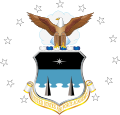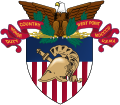Cadets accused of violating the Honor Code face a standardized investigative and hearing process. First they are tried by a jury of their peers. If they are found guilty, the case will go up to the commandant of the academy who will give his recommendation, then to the superintendent of the academy, who has the discretion to either impose sanctions or recommend that the Secretary of the Army expel the cadet from the academy.
History and relevance
The premise behind the Honor Code is as old as the academy itself. When the academy was founded in 1802, the officer corps operated on a simple code of honor—an officer's word was his bond. Sylvanus Thayer, superintendent of the academy from 1817 to 1833, explicitly banned cheating as part of his efforts to increase the academy's scholarship standards. Allegations of theft were dealt with under normal Army regulations until the 1920s. The first major step toward formalizing the unwritten Honor Code came in 1922 when Superintendent Douglas MacArthur formed the first Cadet Honor Committee, which reviewed all allegations of honor infractions. In 1947, Superintendent Maxwell Taylor drafted the first official Honor Code publication, which is considered the first codification of the Cadet Honor Code. Although failure to report violations had long been reckoned as grounds for expulsion, the code wasn't formally amended to expressly forbid "toleration" until 1970. [1]
In August 1951, Time reported that 90 of the academy's 2,500 cadets were facing dismissal for mass violations of the honor code related to "cribbing", receiving the answers to exams ahead of time, allegedly through upperclass tutors who were assisting other cadets, mostly dedicated football players, to study for those exams. [2]
The Army arranged for an investigation by a panel which included famed jurist Learned Hand and retired generals Troy H. Middleton, then president of Louisiana State University, and Robert M. Danford, a former commandant of cadets at West Point. [3] The board recommended dismissal of all 90 suspected violators of the Honor Code, and while the Army and Congress debated the issue and its causes, the cadets were left with a cloud hanging over their heads and their futures.
There have been other instances of mass cheating scandals at the academy, including two very famous ones. In August 1976, where it was found that possibly over half of the junior class at the academy had violated the honor code by cheating on a case assignment. [4] In 1951, 37 members of the football team were dismissed after they were found to have cheated. The team was so decimated that it fell to 2–7, the only losing record suffered by legendary coach Red Blaik.
In 2015, West Point adopted the Willful Admission Program, which offered leniency to cadets for first-time violations of the Honor Code. [5] In December 2020, 73 cadets were accused of cheating on a calculus exam in May 2020, when West Point had shifted to virtual classes due to the COVID-19 pandemic. A total of 59 cadets admitted to cheating on the exam. [6] Of the 73 accused cadets, six resigned while being investigated; four cadets were acquitted, and cases were dropped against two. [7] Among the 61 cadets found guilty of cheating, eight were expelled, [7] including several who were eligible to apply for readmission to West Point after serving for eight months to a year as enlisted soldiers. [5] Fifty-one cadets admitted responsibility and entered the Willful Admission Process, [7] under which they were placed on probation and required to complete after-hours classes and discussions on ethics. [6] As part of the program, 51 cadets were turned back a year and two were turned back six months. [7] In 2021, the academy ended the Willful Admission Process after concluding that it was ineffective at encouraging compliance with the Honor Code. [5] [8]



